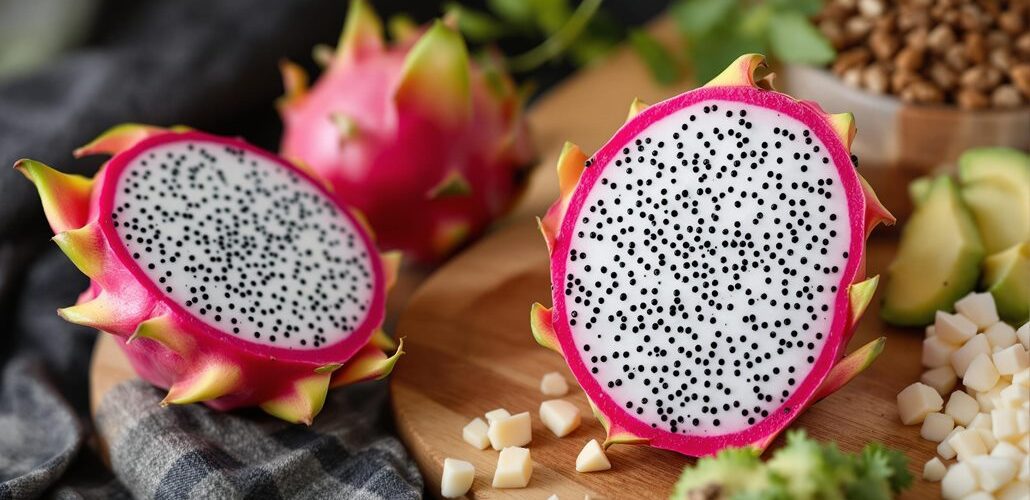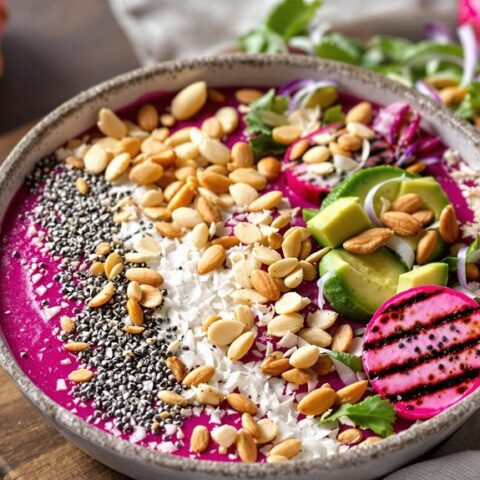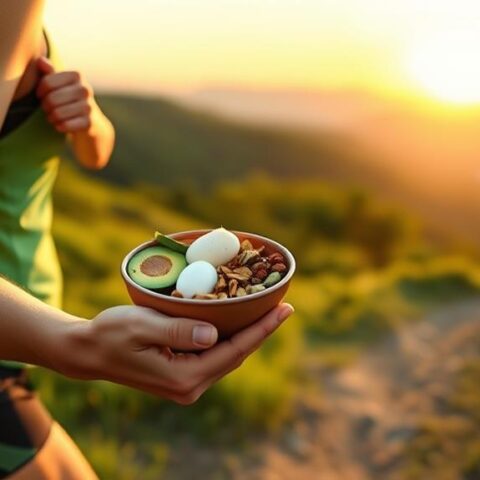
Dragon fruit is generally not classified as keto-friendly due to its net carbohydrate content, which is approximately 9 grams per 100 grams after accounting for fiber. While maintaining ketosis, portion control is essential since a typical serving could exceed carbohydrate limits. Despite its higher carb content, dragon fruit offers nutritional benefits including vitamin C and dietary fiber, which aid in digestion and provide antioxidants. To incorporate it into a keto diet, limiting servings to under 100 grams and pairing with high-fat foods like avocado is recommended. Exploring creative recipes can integrate dragon fruit into a ketogenic meal plan.
Key Takeaways
- Dragon fruit contains 9 grams of net carbs per 100 grams, requiring strict portion control for keto compliance.
- It offers 3 grams of dietary fiber per 100 grams, potentially moderating blood glucose impact.
- A 200-gram serving provides 24 grams of total carbohydrates, exceeding typical keto limits.
- Pair dragon fruit with high-fat foods like avocado to enhance keto meal compliance.
- Use dietary tracking apps to monitor dragon fruit intake and maintain ketosis.
Dragon Fruit's Carbohydrate Content
Dragon fruit, also known as pitaya, is classified as a lower-carbohydrate fruit, containing approximately 12 grams of total carbohydrates per 100 grams. This composition includes around 9 grams of sugar and 3 grams of fiber, resulting in a net carbohydrate content of approximately 9 grams per 100 grams.
The net carbs metric, which discounts fiber due to its negligible impact on blood glucose levels, is essential for individuals adhering to low carb and ketogenic diets. Such diets typically require careful monitoring of carbohydrate intake to maintain ketosis, a metabolic state where fat becomes the primary energy source.
In a 200-gram serving, dragon fruit provides about 24 grams of total carbohydrates, translating to 18 grams of net carbs. Given the ketogenic diet's carbohydrate limits, generally between 20-50 grams of net carbs daily, dragon fruit can be integrated in moderation, allowing individuals to enjoy its unique taste while adhering to dietary restrictions.
However, meticulous portion control is vital to guarantee daily carbohydrate goals are not exceeded. Therefore, dragon fruit's lower carb profile, combined with its fiber content, makes it a viable fruit option for those managing their carbohydrate intake on a ketogenic diet.
Nutritional Benefits of Dragon Fruit
Boasting a rich profile of essential nutrients, dragon fruit is a low-calorie, nutrient-dense option that can be advantageous for individuals on a ketogenic diet. With approximately 12 grams of carbohydrates per 100 grams, the fruit's net carb content stands at about 9 grams due to its 3 grams of dietary fiber. This fiber not only aids digestion but also enhances satiety, promoting effective blood sugar control. The nutritional benefits of dragon fruit extend further into its micronutrient composition, making it a valuable addition to a keto regimen.
| Nutrient | Amount per 100g | Benefit |
|---|---|---|
| Calories | 60 kcal | Low-calorie, supports weight management |
| Vitamin C | 4.3 mg | Antioxidant, boosts immune function |
| Carbohydrates | 12 g | Provides energy, controlled by fiber |
| Fiber | 3 g | Enhances digestion, maintains blood sugar |
| Net Carbs | 9 g | Suitable for moderate keto inclusion |
In addition to these, dragon fruit is a significant source of essential minerals such as magnesium and iron. These minerals are pivotal for energy production and red blood cell formation, consequently, incorporating dragon fruit can offer substantial nutritional benefits while keeping net carbs in check, aligning with the goals of a ketogenic diet.
Dragon Fruit's Role in Keto Diet
In the domain of ketogenic diets, dragon fruit plays a nuanced role due to its carbohydrate profile. With approximately 12 grams of carbohydrates per 100 grams, and a net carb count of around 9 grams after accounting for fiber, dragon fruit is not typically classified as keto-friendly fruit. However, its high fiber content can aid digestion, potentially moderating its impact on blood glucose levels.
Additionally, improved insulin sensitivity is essential for managing blood sugar, which may be indirectly supported by the high fiber content of dragon fruit. This makes it feasible to include dragon fruit in a keto diet, provided strict portion control is exercised.
Maintaining ketosis requires careful monitoring of macronutrient intake. For those adhering to a stringent keto regimen, limiting total daily carbohydrate intake to 20-50 grams is vital. A 200-gram serving of dragon fruit could contribute 24 grams of total carbs, nearing these limits.
Therefore, incorporating dragon fruit into a keto diet necessitates precision in portion control to prevent exceeding carbohydrate thresholds.
Additionally, dragon fruit is rich in antioxidants and vitamin C, which can support overall health while on a restrictive diet. By tracking net carbs and creatively integrating dragon fruit into meals, individuals can enjoy its nutritional benefits without compromising ketosis.
This approach enables the inclusion of dragon fruit as a rare treat within a keto dietary framework.
Creative Keto Recipes With Dragon Fruit
Exploring the integration of dragon fruit into the ketogenic diet reveals innovative culinary possibilities that align with macronutrient constraints.
Dragon fruit, a low-carb fruit, can be seamlessly incorporated into various keto recipes, offering both visual appeal and nutritional benefits. Its unique flavor profile and low net carbs per serving make it a suitable option for those adhering to a ketogenic lifestyle. The fruit's richness in essential vitamins and minerals further enhances its appeal for keto enthusiasts.
- Keto Smoothie: Blend dragon fruit with spinach, almond milk, and a few berries. This concoction maintains a low net carb count while providing essential micronutrients and antioxidants.
- Dragon Fruit Salad: Combine diced dragon fruit with avocado, cucumber, and olive oil. This mixture delivers a balance of healthy fats and fiber, optimizing nutrient density without exceeding carb limits.
- Keto Parfait: Layer dragon fruit puree with unsweetened coconut yogurt and chopped macadamia nuts. This dessert aligns with low-carb guidelines, offering a satisfying treat with minimal net carbs per serving.
Dragon fruit's versatility extends to making ice cubes for keto beverages or enhancing breakfast bowls with low-carb nuts and seeds.
Portion Control Strategies
Managing portion control strategies is vital for effectively incorporating dragon fruit into a ketogenic diet. One must pay close attention to portion sizes to prevent disrupting ketosis. For those seeking a low-carb alternative, understanding the carbohydrate content of foods is significant. A controlled portion of around 100 grams of dragon fruit delivers approximately 12 grams of total carbohydrates, resulting in 9 grams of net carbs after fiber reduction.
This necessitates meticulous carb counting to guarantee consumption aligns with the ketogenic macronutrient distribution, typically allowing 20-50 grams of carbs daily. Utilizing dietary tracking applications can facilitate accurate monitoring of net carb intake from dragon fruit, ensuring it remains an occasional indulgence rather than a dietary staple.
By doing so, individuals can maintain their carb intake within acceptable limits while still benefiting from the fruit's nutritional attributes. Pairing dragon fruit with low-carb ingredients, such as nuts or leafy greens, can further aid in achieving satiety without surpassing carb thresholds and can enhance dietary balance.
Additionally, incorporating dragon fruit into creative recipes such as keto-friendly smoothies or desserts can provide flavor variety while keeping carb counts in check. This approach not only diversifies the ketogenic meal plan but also supports effective carb management strategies.
Keto-Compatible Fruit Alternatives
In evaluating keto-compatible fruit alternatives, strawberries and raspberries emerge as low-carb options, with net carb contents of approximately 6 grams and 5 grams per 100 grams, respectively, while offering significant fiber and antioxidant benefits.
These fruits can be consumed in moderation similar to how leafy greens like spinach and kale are incorporated into a keto diet for their nutritional benefits.
Avocados, presenting only 2 grams of net carbs per 100 grams, are particularly advantageous for keto diets due to their high content of healthy fats and fiber.
Additionally, blackberries, with around 5 grams of net carbs per 100 grams, provide versatility in keto meal planning, and zucchini, containing less than 4 grams of net carbs per 100 grams, serves as a low-carb, nutrient-dense vegetable substitute.
Low-Carb Fruit Options
Many individuals following a ketogenic diet seek low-carb fruit options that align with their nutritional goals. Selecting fruits with low net carbs is vital to maintaining ketosis, as these choices support the keto diet's macronutrient distribution.
Dragon fruit, with approximately 10 grams of net carbs per 100 grams, requires careful portion control, making it a moderate option for keto enthusiasts. However, several other fruits offer lower net carb counts, allowing for greater flexibility and nutrient intake.
- Avocados: With only 2 grams of net carbs per 100 grams, avocados provide healthy fats and fiber, making them an ideal choice for keto adherents.
- Zucchini: Often considered a vegetable, zucchini contains about 3 grams of net carbs per 100 grams and can substitute for higher-carb fruits in various recipes.
- Tomatoes: At 3 grams of net carbs per 100 grams, tomatoes add flavor and essential nutrients without greatly impacting carb counts.
Incorporating these low-carb fruit options can contribute to a balanced ketogenic diet by offering essential vitamins and minerals while minimizing carbohydrate intake.
Nutrient-Dense Berry Choices
After examining low-carb fruit options for individuals on a ketogenic diet, it becomes evident that nutrient-dense berries can serve as keto-compatible alternatives while still supporting dietary goals. Raspberries, blackberries, and strawberries, each with unique nutrient profiles, offer a low-carb solution while providing essential vitamins and antioxidants. Raspberries and blackberries contain approximately 5 grams of net carbs per 100 grams, making them ideal choices for those adhering to a keto diet. These berries are not only rich in antioxidants but also provide dietary fiber, contributing to digestive health.
Strawberries, although slightly higher in net carbs at 6 grams per 100 grams, remain a viable option for keto enthusiasts. They are packed with Vitamin C, enhancing immune function and combating oxidative stress. The following table summarizes the nutrient analysis of these berries:
| Berry | Net Carbs (per 100g) |
|---|---|
| Raspberries | 5g |
| Blackberries | 5g |
| Strawberries | 6g |
Incorporating these berries into a keto diet facilitates not only adherence to low-carb foods but also promotes a diverse nutrient intake. These nutrient-dense options enhance dietary variety while maintaining the low carbohydrate threshold essential for ketosis.
Avocado Benefits on Keto
Boasting a unique blend of nutrient density and low carbohydrate content, avocado stands out as a quintessential fruit for those adhering to a ketogenic diet.
With merely 2 grams of net carbohydrates per 100 grams, avocado is exceptionally low in carbs, making it an ideal choice for maintaining ketosis. The significant presence of healthy fats, approximately 15 grams per 100 grams, aligns perfectly with the high-fat requirements of a ketogenic lifestyle.
These fats, primarily monounsaturated, are known to support cardiovascular health and provide long-lasting energy.
In addition to its macronutrient profile, avocado offers substantial dietary fiber, approximately 7 grams per 100 grams. This fiber content not only aids in digestion but also enhances satiety, which is essential for managing hunger on a restrictive diet.
The micronutrient composition of avocado, including potassium, is remarkable, as it supports hydration and muscle function, essential for those on a keto regimen.
- Low in Carbs: Only 2 grams of net carbs per 100 grams, ideal for ketosis.
- Rich in Healthy Fats: Approximately 15 grams of monounsaturated fats.
- High in Fiber: About 7 grams per 100 grams, aiding digestion and satiety.
Incorporating avocado into various dishes enhances flavor, texture, and nutritional value, making it an indispensable component of keto-friendly culinary planning.
Assessing Dragon Fruit Variants
When evaluating the keto compatibility of dragon fruit variants, it is essential to contemplate their nutritional profiles meticulously. The primary variants, namely Hylocereus undatus (white-fleshed), Hylocereus costaricensis (red-fleshed), and Hylocereus megalanthus (yellow-fleshed), present similar nutritional characteristics, making them potentially suitable for ketogenic diets when consumed judiciously.
Each variant contains approximately 12 grams of total carbohydrates per 100 grams. Upon accounting for dietary fiber, which is about 3 grams per 100 grams, the net carb count reduces to approximately 9 grams. This net carb content warrants careful consideration of portion sizes to avoid surpassing daily carbohydrate limits intrinsic to ketogenic regimens.
Additionally, the reduced insulin response due to lower carb intake can be beneficial for appetite regulation, as it helps manage hunger and cravings effectively. In addition, the intrinsic sugar content of approximately 9 grams per 100 grams reinforces the need for stringent portion control.
Given the keto diet's emphasis on low carbohydrate intake, maintaining portions under 100 grams is advisable to mitigate excessive carb consumption. Despite the carbohydrate concentration, the fiber content in dragon fruit offers a mitigating effect by reducing net carbs, enhancing its viability as a keto-compatible fruit.
Consequently, meticulous nutrient analysis is paramount to incorporating dragon fruit variants into a well-balanced ketogenic dietary framework.
Tips for Balancing Keto Meals
Balancing keto meals effectively requires strategic selection of low-carbohydrate foods to maintain ketosis while guaranteeing nutritional adequacy.
Incorporating essential electrolyte supplements can help prevent keto flu symptoms, such as headaches and fatigue, during the adaptation phase.
When integrating dragon fruit into keto meals, it is vital to account for its net carbs, primarily derived from its total carbohydrate content minus fiber.
With dragon fruit containing approximately 12 grams of total carbohydrates per 100 grams, monitoring serving size is necessary to avoid surpassing the daily carbohydrate limit of 20-50 grams.
Moderation in consumption is key, allowing the inclusion of dragon fruit without compromising ketosis.
Key strategies for balancing keto meals include:
- Incorporate High-Fiber Foods: Choose high-fiber options like dragon fruit to help offset net carbs, improving digestive health and satiety.
- Pair with High-Fat, Low-Carb Ingredients: Combine dragon fruit with avocado or nuts to enhance flavor and nutritional profile, adhering to keto guidelines.
- Utilize Meal Tracking Tools: Employ digital tools to guarantee that the macronutrient distribution, including dragon fruit, aligns with keto goals.
Frequently Asked Questions
How Do I Know What Kind of Dragon Fruit I Have?
To identify dragon fruit varieties, examine the skin color and size. Hylocereus undatus displays pink skin; Hylocereus costaricensis, red flesh; Hylocereus megalanthus, yellow skin. Each variety offers distinct dragon fruit taste and texture characteristics.
How Can You Tell if Dragon Fruit Is Safe to Eat?
To determine if dragon fruit is safe to eat, assess its ripeness indicators such as vibrant color and slight softness. Its nutritional benefits include antioxidants and fiber, while its taste profile offers a mildly sweet flavor with crunchy seeds.
Is Dragon Fruit High in Carbs?
Dragon fruit is not excessively high in carbs; it contains approximately 9 grams of net carbohydrates per 100 grams. Nutritional value analysis shows its carb content can be significant depending on the serving size, impacting dietary plans.
How Do You Know if a Dragon Fruit Is Self Fertile?
To determine if a dragon fruit is self-fertile, examine its cultivation and fruiting habits. Self-fertile varieties require minimal pollination methods and produce fruit independently, unlike those needing hand or cross-pollination for maximum yield.
Conclusion
The keto compatibility of dragon fruit hinges on its carbohydrate content, which necessitates meticulous portion control to fit within a ketogenic framework. Despite its moderate carbohydrate presence, dragon fruit offers considerable nutritional benefits, including antioxidants and fiber. Integrating dragon fruit into keto-friendly recipes can enhance dietary variety without compromising ketosis. Alternative low-carb fruits should be considered to diversify nutrient intake. Ultimately, strategic meal planning and careful assessment of dragon fruit variants are essential for maintaining a balanced ketogenic diet.










No Comments